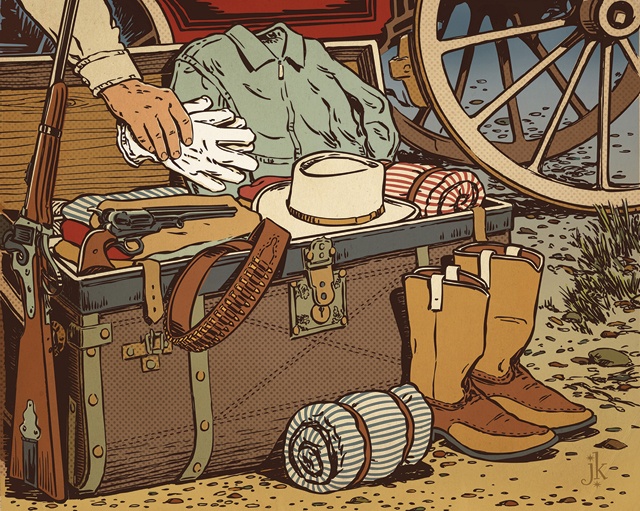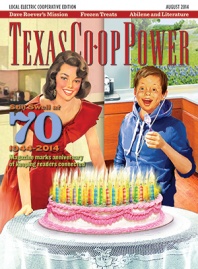After leaving San Antonio, there was not a single house or settlement between Fort Clark (present-day Del Rio) and San Elizario (near El Paso) until 1856. At least two weeks were required to cross this 550-mile expanse, and meeting an occasional California-bound wagon train provided the only contact with civilization.
A typical mail train consisted of one or two heavy wagons and a coach for passengers, with six or more men armed with rifles and repeating pistols as escorts.
A California newspaper recommended these supplies for the trip: “one Sharps rifle and a hundred cartridges; a Colt’s Navy revolver and two pounds of balls; a knife and sheath; a pair of thick boots and woolen pants; a half-dozen pair of thick woolen socks; six undershirts; three woolen over-shirts; a wide-awake hat; a cheap sack coat; a soldier’s overcoat; one pair of blankets summer and two in winter; a piece of India rubber cloth for blankets; a pair of gauntlets; a small bag of needle and pins, a sponge, hair brush, comb, soap, etc., in an oil-silk bag; two pairs of thick drawers, and three or four towels.” These supplies counted toward the 40 pounds of baggage included in the ticket price; however, because passengers were expected to help fend off the hostile American Indians who often harassed the trains, the weight limit exempted firearms.
Conditions were not much improved in 1859 when George F. Pierce, a minister traveling to San Diego from Georgia, described on May 20 the ritual of mealtimes away from a station or other shelter (“Life and Times of George F. Pierce,” Hancock Publishing Company, 1888): “On stopping, all the employees of the stage-line spread themselves in quest of fuel. A few dry sticks were soon gathered, the fire kindled, the kettle put on, and water heated; an old bag is brought from its resting place in the stage boot. Its open mouth laid upon the ground, the other end is seized and suddenly lifted, and out comes tin-cups and plates, iron-spoons, knives and forks, helter-skelter; another bag rolls slowly out, containing the bread; presently another cloth is unrolled, and a piece of beef appears. Now a box is brought forth, the lid is raised, and we behold coffee, tea, sugar, salt, pepper, and pickles—a goodly supply.”
Then “the ground coffee is put in, water poured on, and all well shaken—the coals are ready and the pot boils. By this time the frying-pan is hot, the lard melted, the meat sliced, and soon our senses are regaled by the hissing urn and the simmering flesh. … the table-cloth of many colors, all inclined to dark, as innocent of water as the loom that made it, is spread upon the ground. Plates, tin-cups, knives and forks are arranged in order, and Ramon announces: ‘Supper ready, gentlemen.’ All hands gather about ‘the cloth,’ oblivious of dirt, careless of dainties, and the necessaries of life disappear very rapidly. The fragments are left for the prairie wolf and the birds of the air; the cloth is shaken … the unwashed instruments are boxed and bagged, and we are ready to travel.”
About half past 10 in the evening they camped on a hill, providing the “watch” with a view for miles around. The stage “was soon converted into a bed-chamber for Mrs. Pierce and (daughter) Ann. By a judicious arrangement of trunks and cushions a bed was made—the curtains were buttoned down—the wife and child laid down; I wrapped my travelling blanket around me and slept soundly. The gentlemen all spread their cloaks, shawls, and blankets on the ground, aye, even the dirty road—for fear of ‘the snakes in the grass’—and, as they reported in the morning, rested well.”
This routine was repeated every day for at least two weeks on the route from San Antonio to El Paso.
One can’t help but wonder how we 21st-century Americans would have fared on such a lengthy and trying journey.
———————-
George Mullins is an Austin writer.


